Key Takeaways
- WMS software helps retailers, wholesalers, 3PLs, and e-commerce merchants improve accuracy, efficiency and profitability.
- The best WMS software providers offer automation, real-time visibility and integrations to streamline fulfillment.
- Brightpearl stands out as an all-in-one Retail Operating System (ROS) with built-in WMS capabilities tailored for modern retail and wholesale.
- Choosing the right WMS involves assessing features, integrations, deployment type and total cost of ownership.
- Cloud-based WMS solutions offer better scalability, real-time data and lower operational overhead.
If your business owns and operates a warehouse, you already know how difficult it is to keep everything in order. You depend on each member of your team to navigate thousands upon thousands of items daily and properly reconcile them.
From the receiving of inbound goods to the carriers delivering products to the customer’s doorstep, every single time an item moves, something could go wrong.
Your warehouse managers do all they can to keep every plate spinning. Of course, they can’t do it alone, your warehouse, admin, and other support staff all have to work together as one to ensure business success.
The question today is, why are you not using WMS for your business?
What Is WMS Software?
Warehouse Management Software (WMS) helps businesses control, automate and optimize every part of warehouse operations — including receiving, putaway, picking, packing and shipping. A modern WMS software provider also offers real-time visibility, automation, and seamless integrations to reduce errors and improve fulfillment efficiency.
Top WMS software providers to consider
There are a huge number of software options available today for warehouse management. But don’t worry, we’ve done most of the hard work for you. We’ve come up with a baker’s dozen of our favorite WMS system providers to suit your specific needs.
1. Brightpearl
Brightpearl is much more than a standalone WMS. As an ROS, it is focused on helping multichannel e-commerce merchants grow fearlessly. It does this by offering a host of tools to improve and streamline inventory & order management as well as warehouse management.
Brightpearl’s warehouse management software features follow suit with the rest of the tools included in the application. This means you get the power of Brightpearl’s Automation Engine to automate workflows that are tailored to your needs. You can also expect accurate inventory tracking with flexible pick & pack workflows.
Brightpearl WMS also lets you automate fulfillment on specific predefined orders as well as drive down handling time for batching, scanning, and picking. You also get the powerful insights of Demand Planner which uses your sales history to take the guesswork out of your demand forecasting. Even taking into account seasonality and promotions.
Brightpearl is laser-focused on meeting the needs of every retailer and wholesaler. From one central hub, you can track, monitor, automate, and optimize every step of the supply chain.
Other features include:
- Reporting tailored to e-commerce, retail & wholesale brands—combine data from all your sales channels to find out what’s hot or not
- Retail accounting and reporting for financial insight
- Built for retail—includes POS and Order Management capabilities and more
- CRM functionality
- High-performance Plug & Play integrations for your existing platforms like Quickbooks, Xero, eBay, Shopify, Magento, BigCommerce, and many more
- Huge partner ecosystem to source non-standard integrations in weeks or less
Businesses that use Brightpearl can expect to save an average of two months a year with automation, reduce human error by up to 65%, and save on labor costs by 50%. The Brightpearl platform is perfect for omnichannel retailers or wholesalers looking to grow over the next 12 months.
How to choose the right WMS software provider
Today there is an ever-expanding sea of options available for businesses looking for a warehouse management solution. With such a high degree of diversity, this means companies can find something that does exactly what they need it to do and also fit their budget.
Small businesses may only need a barebones platform to help organize and improve their warehouse operations. Larger businesses may need a full suite of software tools to handle every aspect of their logistics and transportation chain. Regardless of the type and size, you must know what you need from a WMS provider before you can begin the search for a solution.
Key questions to ask WMS vendors
The search for the right WMS solution starts by asking the right questions. When you begin to narrow your list of options, you will need WMS vendors to be able to answer the following:
- What software, features, and tools are included with the platform?
- Is it a standalone WMS or does it have more capabilities?
- What integrations or cross-platform functionality do they offer?
- How much will it cost to implement?
- How much will it cost to upgrade or scale when the time comes?
Essential WMS software features to prioritize
When it comes to warehouse management solutions, there can be a lot of noise to sift through. It’s important to get this sort of thing right. The average business will spend 15 weeks selecting the right WMS.
Stay grounded in your hunt for the right tools by focusing on the most important WMS features:
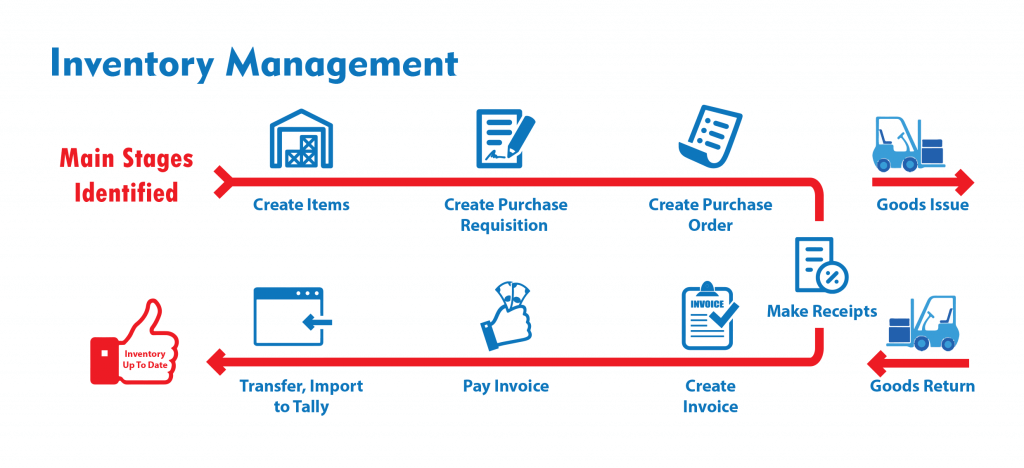
Source: medium.com
What WMS software can do for your business
WMS software can do a lot of things for your business. When it comes to warehouse management the right applications can:
Improve employee productivity and operational efficiency—Advanced WMS platforms do this through automation, pre-filled forms, and the elimination of redundant tasks. And having all warehouse processes controlled in one place cuts down on wasted time.
“Brightpearl has enabled us to redefine our supply chain and mature our thinking as a business. Brightpearl allowed us to unlock capabilities that were not possible before.”
– Aaron Alpeter | SVP of Supply Chain, The Flex Company
When The Flex Company started using Brightpearl they were blown away by how much more efficient their operations were. “The platform has been a powerful factor in our growth,” says SVP Aaron Alpeter. He went on to say that “Our team is definitely more productive—they’re around twice as fast at processing orders now”. This increase in operational efficiency led the company to stimulate 100% YOY growth.
Better labor and stock management—Employees can get time back from menial and repetitive tasks and instead focus on the more important tasks for the business. This can also save on the wage bill! And perishable goods are easily tracked and optimized for FIFO or whatever system fits your needs.
Transparency, accuracy, and visibility—Real-time inventory tracking from barcodes, RFID tags, or other methods lets you see where every single item is at all times. A good WMS severely reduces human error and brings inventory count accuracy that is unmatched. Team members and managers can access real-time counts and data from computers and smart devices.
Happy suppliers—Platform management and automation of POs, receiving, and payment helps everything happen quicker. Restocks are ordered at the right time (so less pressure on the supplier), payment is sent on time, and loading bays are ready to receive on time. Your suppliers will be so thrilled that they may even send you a thank you card!
Happy customers—With an efficient WMS platform, picking, packing, and shipping all happen at a rapid pace. And with live tracking, the possibility of errors is greatly reduced. Your customers will get the correct items within the stated time frame and that means more happy customers and repeat buyers.
Core functions every WMS software should offer
Whether standalone or as part of a broader platform, every WMS is built to make warehouse management easier. Manual stock counts are painful and extremely time-consuming. Not to mention all the paperwork that must be filed for receiving, shipping, purchase orders, and more.
WMS software also helps connect your warehouse to the rest of your business operations. Your data is centralized to help save your team time and inform better decision-making from management. Many WMS offerings can even do a lot more. But all solutions share the same core functions:
Inventory Management
It can be argued that inventory management is number one for all WMS. Live tracking of all inventory movement across multiple locations is invaluable. It is also important for businesses to have visibility of all stock no matter where it is in the supply chain. This is accomplished with barcoding, sensors, and other types of tracking.
Real-time inventory management makes it easy to reduce human error. But it can also help customer service (CS), manufacturing, or other departments track down the rare mistake and quickly find a solution.
Picking
Order picking is one of the most manual processes of warehouse management. In a disorganized warehouse, it can become a real bottleneck to your operations. Warehouse management platforms help to prevent a logistical nightmare with smart layout planning and accurate stock locations. This lets your team members pick and pack with maximal efficiency.
Shipping
Poor shipping practices can make or break your chances of snagging repeat and loyal customers. WMS streamlines the process with accurate address labels, forms, and instructions for shipping the product. It also helps your warehouse managers with finding a balance between value and time with the major shipping carriers.
Reporting
WMS gives your team precise and up-to-date information on any component of your warehouse and supply chain. Most platforms offer highly customizable homepages or dashboards as well as apps for mobile devices. This helps every member of your team quickly access the information they need at any time.
Types of WMS software
Warehouse management software is growing in adoption across the globe in nearly all industries and for businesses of any size. The technology continually evolves to be more innovative, intuitive, and affordable. Today there are a greater number of amazing inventory management options available than ever before.
As with all things, the greater the number of options, the more difficult it can be to find the right one. In other words, we are spoilt for choice. The good news is that many products are tailored for specific industries or company sizes.
While others focus on certain capabilities or being as complex or as simple as possible. So no matter if you’re an eBay seller or a global enterprise, there is a WMS solution that will work for you.
The first step to narrowing down the long menu of warehouse management options is to decide what “type” of solution you are looking for. In this instance, the type refers to the actual software or platform. There are three main types: ERP-integrated, Supply Chain Module, and Standalone.
ERP-Integrated
ERP-integrated WMS comes with most of the functionalities of a standard WMS. However, the warehouse management tools are a small part of a much greater whole. ERP systems are either for businesses adding the integration to their existing platform or looking to level up in enterprise resource planning and management.
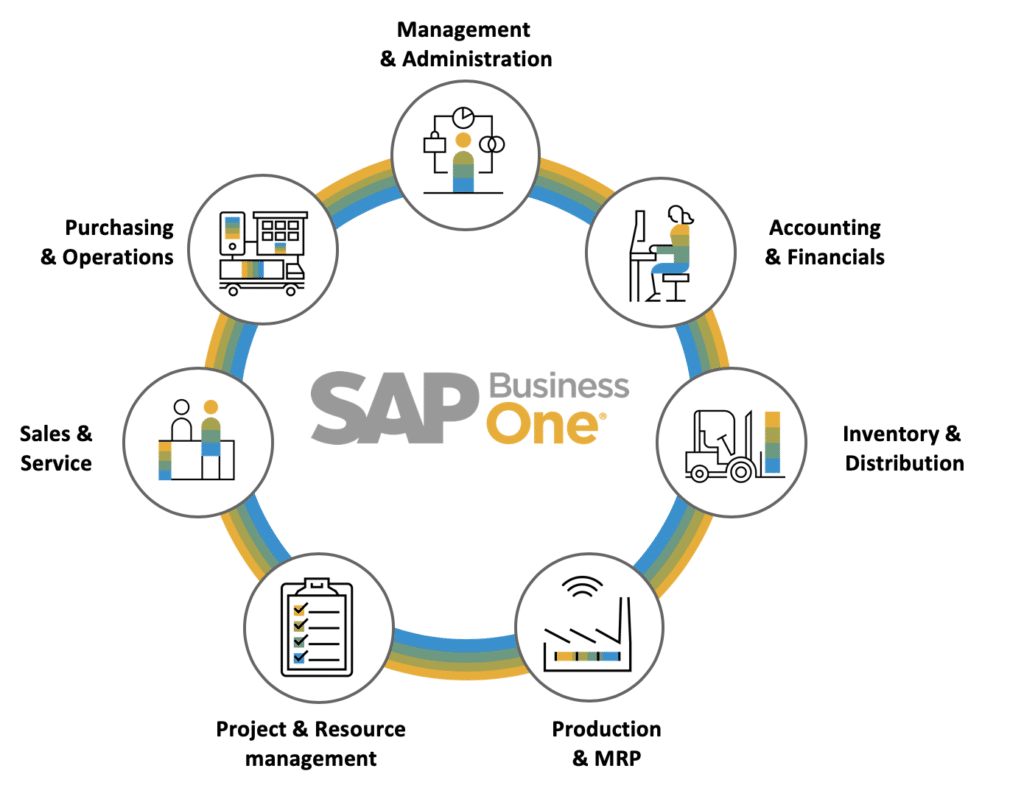
Source: Medium.com
The possible benefits for enterprises using opting for this type of WMS are:
- A centralized hub for data of all business processes. This links data across teams and breaks down silos.
- More consistent customer experiences and better inter-departmental communication. Everyone is using the same system and looking at the same reports.
- End-to-end workflow management of the supply chain. The ERP will streamline other business processes with those of your warehouse operations to simplify logistics-related tasks.
An ERP-integrated WMS, though, will likely be missing out on the most advanced and cutting-edge warehouse and inventory management features to best suit retailers. They will also limit you on how you can connect your data to other platforms and you will almost always end up paying for features that you don’t need.
Supply Chain Module
Supply chain management (SCM) is a step above what a WMS is concerned with. Complete management of the supply chain covers a broader scope, from raw materials to shipping. However, some WMS solutions will have supply chain management capabilities.
Supply chain management modules are sort of in-between an ERP integration and a standalone WMS. This is because the modules are built to work well with other management solutions from the same provider within an ERP system. But they are also fully functional on their own.
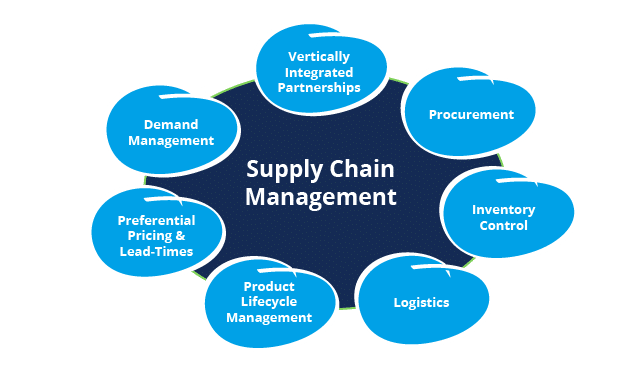
Source: solutiondots.com
The potential benefits of using a supply chain module are:
- Plugs straight into your existing modules. If you already have solutions for purchasing, accounting, and fleet management, a supply chain module will integrate with them seamlessly. Onboarding and implementation lead time are close to zero.
- Gives businesses a complete view and command of their entire supply chain. This helps teams at every step in the process stay unified and organized.
- Great for automation of processes from within and without the supply chain.
- Much cheaper than an ERP. Modules let you buy only the software solutions you need for your business. This can help many business types cut expenses.
As a standalone solution, supply chain modules may be missing out on many of their best features. And they may overlap with some of your existing business tools.
Standalone
For businesses looking solely for a warehouse solution, a standalone WMS is the best option. As these platforms are standalone, they are built by specialists to excel at streamlining every process in warehouse management. They will have the most purposeful and innovative features.
Benefits of standalone WMSs:
- You get the most advanced warehouse management features. Standalone solutions give you the most options when it comes to things like cycle counting, picking, scanning, cross-docking, and more. These software solutions are the most flexible and adaptable.
- You also get more integration capabilities. While packaged on their own, most providers provide out-of-box integrations so you can connect your WMS to the platforms of your choice. And many will allow for custom integrations that give endless possibilities to your business operation stack.
- Pay for exactly what you want. With a standalone, instead of picking a solution to fit your existing system, you can pick the best solution for your business. For SMBs and smaller organizations, this lets businesses get best-of-breed WMS features without having to buy unnecessary or redundant applications.
Some standalone warehouse management software isn’t built to integrate with the rest of your tech stack, this can lead to data disconnects and issues down the line.
Cloud-Based
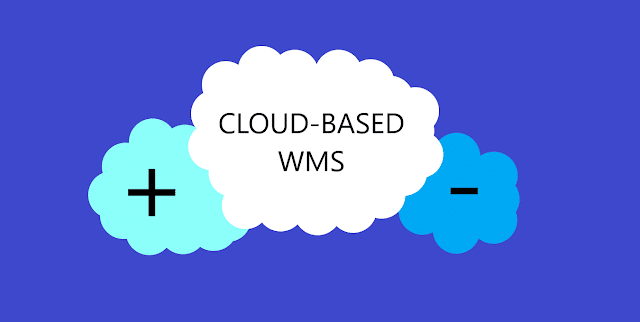
Source: blog.hydrawarehouse.com
Besides choosing between the three main types of WMS, businesses need to decide on what kind of deployment they want.
Warehouse management solutions can be deployed either on-premises or in the cloud. Some software solutions allow for either deployment type, while others can only be implemented one way.
Cloud computing is growing at an accelerating pace with a study predicting 200 Zettabytes of data will be stored in the cloud by 2025. To put that number in perspective, that would amount to half of all the data in the world! There’s no question that cloud-based applications are the present and the future.
With that being said, cloud-based and on-premises deployment each has its pros and cons. On-premises still excels when it comes to cybersecurity and privacy. And with on-premises deployment, you are on your own to maintain and upgrade your hardware (which can be good or bad depending on how you look at it).
But besides giving way to on-premises security, cloud-based deployment comes with the following pros:
Connectivity
SaaS solutions for warehouse and inventory management are cloud-based. They are designed to connect with other business solutions and communicate and collate data in both directions. This lets your business choose which platform they want to work from and dictate how they use it.
Real-Time Data
Both desktop and mobile apps connect to the cloud and can pull accurate and up-to-date information at any time. Team members and managers can access crucial data whether at home, in the office, or on the move.
Lower Investment and Overhead Costs
The on-premises deployment comes with a large upfront expense of hardware and installation fees. Additionally, your IT department (if you can afford one) will have to spend plenty of time on maintenance, upgrading, troubleshooting, and more. Deploying in the cloud eliminates the need to buy hardware and allocate IT resources to your WMS.
Automatic Updates and Improvements
Besides saving time and money, a cloud-based WMS saves you worry and stress. A platform like Brightpearl (which is more than just WMS, but offers all of its key functionality) is continually updated for the best security protection and user experience. New features and integrations can be developed but they will be installed in the background on the cloud. You and your team won’t have to do anything.
Why businesses should use WMS software
How WMS Can Help You Surpass Your Business Rivals
WMS can greatly improve the way your business operates. But did you know that it can also help you gain the upper hand against your competitors? Think about it. Many of your competitors are likely using tattered and outdated systems to handle their warehouse and inventory management.
By upgrading to modern WMS, you can gain ground in your respective market. WMS can help your business attract and retain customers by:
- Reducing sales and fulfillment errors through automation
- Delivering on time
- Rapid processing of returns
- Lower shipping costs for the customer
WMS can also help you attract and retain talent by:
- Eliminating monotonous and tedious processes
- Helping team members get the job done faster and more accurately
- Give managers and team leaders more flexibility in how they work
- Empowering our team members by giving them the right tools for the job
Key benefits of WMS software
There are many benefits to using warehouse management software. Here are some of the best ones:
Online furniture brand, Arthauss, converted to Brightpearl users shortly after creating their rudimentary website. With our ROS platform, the company experienced revenue growth of 175% and made it into the Lightning 50 league table for 2019/20.
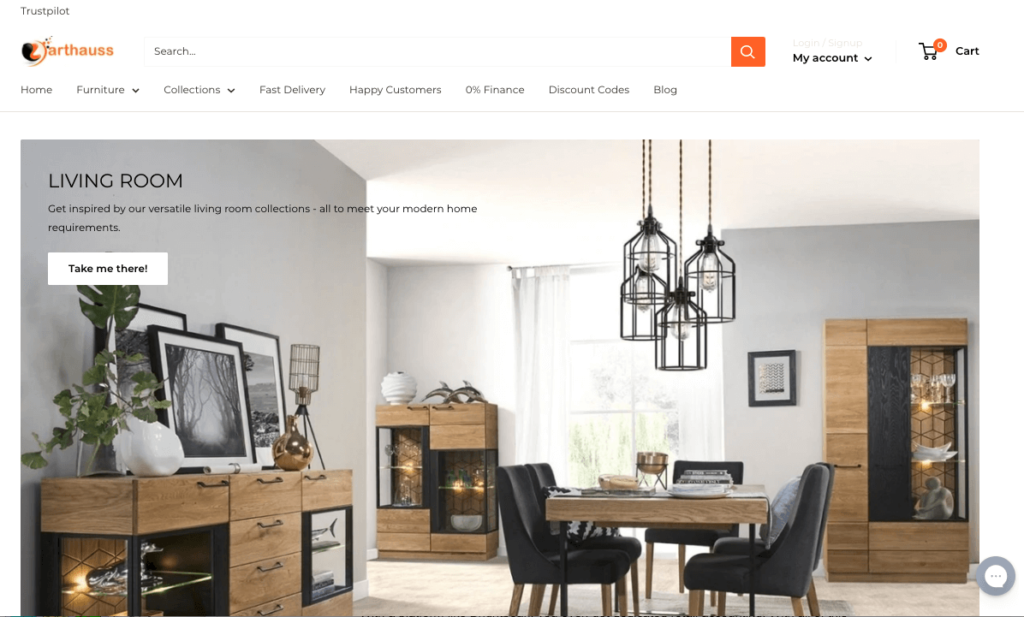
Source: Arthauss.com
Which businesses benefit most from WMS software
Businesses come in all shapes and sizes. WMS fits like a glove for an enormous amount of use cases. Of course, which warehouse solution fits best depends on each business’s unique needs.
Business Types That Should Use WMS
Retail and E-Commerce
Warehouse management solutions can help retailers expand their reach while also retaining happier customers. It makes warehouse management a cinch so your resources can focus on marketing and sales.
For those managing their own warehouses, a management platform lets them command and control their warehousing. A lot of e-commerce merchants depend on distribution centers, warehouses, and fulfillment centers, so making sure that your WMS can connect all these different resources is key.
Wholesalers and B2B
Wholesalers practically run their business from warehouses. By organizing the heart of the business, time and money-wasting due to error and inefficiencies are all but eliminated. Nothing streamlines receiving, packing, shipping, and more better than WMS
Government Agencies
Most government-funded agencies can do with bigger budgets. A WMS solution can help those organizations make the most of their spending. Whether it’s medical supplies, foodstuffs, or non-perishables, inventory management applications make it easy for civil servants to focus on more important things.
3PLs
Maybe it’s a no-brainer, but those whose entire business model is based on logistics better be using a WMS solution. In the digital age, businesses that don’t adopt modern technology will be left behind. Those who want to beat out the competition will gain much more than an edge from all the benefits that come with using WMS.
Business Sizes That Can Benefit from WMS
Let’s take a look at what sizes of businesses that WMS can boost.
Enterprises
From SMEs to all-conquering behemoths, any enterprise should be using a WMS solution. Without the centralization and optimization brought from a management platform, businesses of these sizes will be flushing eye-watering amounts of money down the toilet.
For any business, the number of warehouses, staff, and logistics incur a huge amount of attention. Every redundancy eliminated can save enormous amounts of time and money. For these businesses, even eliminating errors by a few percentage points can mean millions of dollars depending on their annual turnover.
Large companies like these that are running their supply chain logistics with paper and spreadsheets are like publishers using the Gutenberg printing press. WMS integrated with an ROS will improve the overall efficiency of every process in the business.
Large Businesses
Large businesses with a handful or more warehouses can stand to reap the benefits of WMS. That’s because a warehouse management system lets every member on the team allocate less of their time to logistics worries, and more time to things like finance, sales, marketing, and CS.
We’re talking hundreds or even 1000s of employees here. That’s a lot of saved time that can be spent on promoting the business through each team member’s individual talents and abilities. And by using a modern solution like WMS, you will be encouraging innovative and forward-thinking company culture.
SMBs
Small and medium-sized businesses may only use one or two warehouses. But that doesn’t mean WMS isn’t built for them, too! You may think your current warehouse team has it all figured out. But even the simplest inventory management solutions can streamline your warehouse operations like never before.
What’s even better is that, as your business grows, the right warehouse platform can easily scale with the business. Add a new warehouse? No problem. Need to add new product lines? It will take seconds to minutes. Because your small team will already be using the software, you will be investing in your future platform experts for when your business becomes a global success.
Why You Should Choose Brightpearl as Your Warehouse Management Solution
Brightpearl is a retail-focused operating system with a built-in WMS. The system is designed to sit at the heart of your business allowing you full visibility of all your product & channel data.
Brightpearl is hyper-scalable meaning that you have the flexibility to configure the system to fit your processes and workflows. With a huge range of Plug & Play integrations you can launch new sales channels in minutes. to ride with you on your journey to world domination. You get all the advanced capabilities of WMS and much more. Automation and many other functions help to streamline your systems and make business growth the priority.
Features
With Brightpearl, you get the following core features with the Integrated Warehouse Management:
Benefits of Using Brightpearl
The reasons why businesses should use Brightpearl are almost limitless. However, any business, including yours, can expect several major benefits to implementing our platform:
Save Heaps of Time!
Brightpearl comes with a suite of industry-leading and ultimately powerful automation features. You can automate anything from inventory management, shipping, and fulfillment, to POS and more.
Our platform can streamline business processes so that you can eliminate paperwork, redundancy, and tedious tasks. You and your team will be able to concentrate on more important aspects of your business.
Eliminate Errors
We all try our best to achieve the unattainable goal of perfection. But alas, “To err is human” and we should embrace it. That doesn’t mean your organization should embrace errors.
Brightpearl gives you live scanning and tracking, automatic updates, detailed reporting, and more, to help humans get things done. You and your team can trust the system to give you accurate details for auditing, troubleshooting, forecasting, and more.
Gain Next-Level Insights
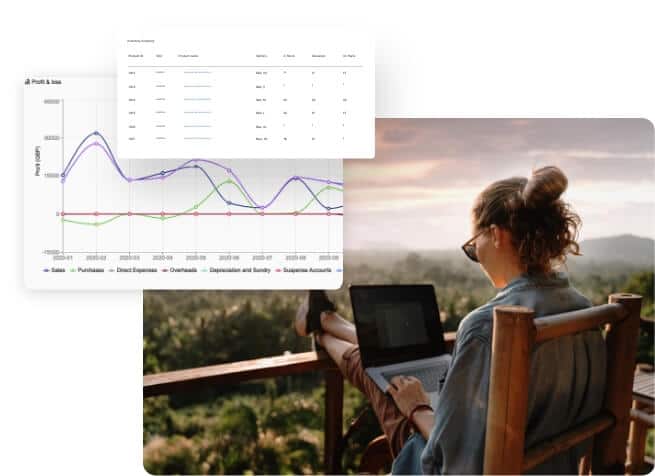
Brightpearl gives you one central hub to compile all of your data and connect the dots. You can customize reporting and analysis to track just about any metric you can think of. Our software gives you a 360 view from your best suppliers to your best sales channels to your VIP customers.
Brightpearl’s smart Demand Planner helps you more accurately forecast and stock optimal inventory levels. That way you can free up cash for other areas of the business. Brightpearl Analytics can take you on the deepest of dives for superior e-commerce analytics and business intelligence. You will gain insights that will assist your team in making better and cost-effective decisions.
The Best Customer Service
At Brightpearl, our CS team is here to help you every step of the way. From the start, we provide an expert-led, fast implementation that has a 97% success rate. Next up is our intuitive onboarding and tailored training process which will turn your staff into platform experts in no time.
According to Jason MacCarthy of Wolverson Fitness, “the training from Brightpearl is really high level[–]I’d say it takes our starters a couple of weeks to become totally fluent in using it.” We even provide on-demand 24/7 webinars and a hand-holding Learning Platform.
Next up, our Customer Success team will catch up with your business for regular “health” checks because we want to ensure you are getting the most you can from our platform. Our team will work together with you to build and reach a Success Plan.
At Brightpearl, customer service is a never-ending process. We will always be there to help you reach your goals and attain perpetual success.
Hyper-Scalable is the Future
Modern businesses like yours need solutions that are as flexible and adaptable as you are. The future is here, and those who remain stuck in the past will go the way of the dodo.
Brightpearl brings your warehousing (and much more besides) into the digital age. With a range of purpose-built Plug & Play integrations and a thriving partner ecosystem for rapid installs of custom integrations, you are future-proofed for adding any new tools that you may need.
Transparent Pricing
Unlike ERPs and other solutions, with Brightpearl you will know exactly how much you are spending for our service each month. There are no extra or hidden fees. We have pricing plans that can fit any budget or need.
Our pricing is simple and targets the growth of your business. You will have a complete and accurate breakdown before you sign anything.
Built for Retail
Our platform is a ROS, which means it’s built for retail and wholesale. Our system streamlines every business process and syncs every data point so you get complete visibility of your business from one central hub. Use our powerful automation to save time, money, and impress your customers.
Conclusion
Warehouse management is a mammoth task for any business to do well. Reaching success always begins with hiring the right people for the job. But they also need to be empowered with the right tools to get the job done. WMS and its related alternatives give your business new life by streamlining the most tedious and error-inducing tasks.
Most importantly, the right WMS for your business will ignite a supernova of growth. This is why every organization needs to do their due diligence and find the right solutions for their industry, business type, and size. Providers like Brightpearl make it easy for you to implement warehouse management along with so many other features and functions, so you can focus more time on growing your business.
Ready to streamline fulfillment and scale your operations? Book a Brightpearl demo to see how our Retail Operating System simplifies warehouse management and boosts accuracy.
Frequently asked questions
What is WMS software?
WMS software is a warehouse management tool that helps businesses track inventory, automate picking and packing, reduce errors and streamline fulfillment. It centralizes warehouse data so teams can work faster and more accurately.
What does a WMS software provider do?
A WMS software provider delivers tools that manage warehouse workflows like receiving, storing, picking, packing and shipping. They also offer integrations, reporting and support to ensure businesses use the software effectively.
What is the best WMS software for retailers?
The best WMS software for retailers is one built for multichannel operations, automation and real-time visibility. Brightpearl stands out because it includes WMS functionality within a full Retail Operating System, making it easier to manage inventory, orders and fulfillment from one platform.
How do I choose a WMS software provider?
Start by assessing your operational needs, required features, automation capabilities, integration requirements and long-term scalability. Compare providers based on accuracy, ease of use, support and their ability to grow with your business.
Is a WMS the same as inventory management software?
No. While inventory management tracks stock levels, WMS software oversees the entire warehouse process including picking, packing, location management and shipping. WMS is much more advanced and operational.
